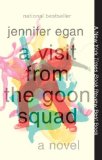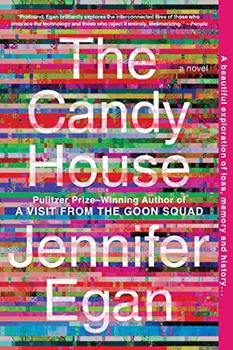Summary | Excerpt | Reading Guide | Reviews | Beyond the book | Read-Alikes | Genres & Themes | Author Bio

"The days of losing touch are almost gone," proclaims one of the many characters in Jennifer Egan's meditation on the loss of youthful idealism to the ravages of time and the secrets that reverberate through the years. It is the early 1990s, and Sasha, Drew, and Rob are students at New York University, bright 20-somethings on the verge of promising lives, in a city aglow with possibility. Bill Clinton has just been elected, the Internet is beginning to bubble up from its underground status into a mainstream phenomenon, and 9/11 is still a blissful decade away. "We'll meet in that new place," says their friend Bix, the Internet prophet, "and first it'll seem strange, and pretty soon it'll seem strange that you could ever lose someone, or get lost." However, the realities of losing touch and getting lost animate this novel, with characters breaking away from each other far more often than coming together.
Rock music provides the connecting thread between these characters as well as their only constant glimmer of salvation; almost everyone in Goon Squad either performs in a band, works for a record company, or avidly listens to music, making the novel a rock fan's dream. Rock music is notoriously difficult to write about, especially in fictional form, where literary platitudes and rhapsodic discursions often fall short of the transformative experience of actually listening to the music. Egan succeeds, though, by offering pithy observations on the sterility of digital remastering ("The problem was precision, perfection; the problem was digitization, which sucked the life out of everything that got smeared through its microscopic mesh") and the overwhelming power of listening to music over head phones ("...the experience of music pouring directly against her eardrums—hers alone—is a shock that makes her eyes well up; the privacy of it, the way it transforms her surroundings into a golden montage.."). Music lovers recognize these sorts of truths as gospel, and Egan's obvious affinity with music, especially punk and post-punk, gives the book all the magic of a favorite song.
My favorite songs have always been the sad ones, and in this respect, Goon Squad does not disappoint. Chapters 3, 4, and 11 contain some of the most heartbreaking depictions of adolescent turmoil that I have ever read: Chapter 3 focuses on Bennie's youth in the San Francisco punk scene and is narrated by Rhea, the perceptive and lonely girl who loves him; Chapter 4 takes us back to the early '70s, on a life-changing African safari with Lou, his girlfriend, and his daughter and son; and Chapter 11, which could stand alone as a prize-worthy short story, explores the complex relationship between young runaway Sasha and the uncle who searches for her in the underbelly of Naples, circa 1988. When Egan bluntly reveals what will eventually happen to her characters, often in a sentence or two, their often-tragic fates carry devastating impact. Even the stories that end more or less happily have a kind of melancholy, as characters exchange the brash vitality of youth for the quiet resignation of adulthood.
While Goon Squad is brilliantly written, it does have a few flaws, the kind of minor irritations that music fans recognize from listening to an otherwise great album marred by the occasional bum note. Aside from the aforementioned Chapter 11, Sasha remains an oddly uninteresting character, one whose alleged allure never seems quite earned, despite such quirks as kleptomania, bright red hair, and an apartment with a bathtub in the kitchen. Often the other characters surrounding her seem much more nuanced, which renders the chapters in which she appears akin to watching a movie for the supporting actors instead of the star.
Likewise, the Jules and Kitty storyline comes across as a pleasant diversion that adds little to the overall plot; their chapter, written in the form of an entertainment article that might have appeared in the '90s heyday of Rolling Stone or Spin, is a dead ringer for the arch meta-narratives of writers like Nicholson Baker and David Foster Wallace, studded with ironic commentary and self-referential footnotes. Egan can write well in any form she chooses, but this section verges on overkill, as does the Power Point format that Sasha's precocious daughter uses to tell the tale of Sasha's adult life as a mother and sculptor in the California desert. Still, at its best, A Visit from the Goon Squad approaches the mournful majesty of the song lyrics from which Chapter 11's title, "Good-bye, My Love," may be taken: "Good-bye, my love/Maybe for forever/Good-bye, my love/The tide waits for me/Who knows when we shall meet again/If ever…"("Time" by the Alan Parsons Project, 1981).
![]() This review was originally published in The BookBrowse Review in July 2010, and has been updated for the
May 2011 edition.
Click here to go to this issue.
This review was originally published in The BookBrowse Review in July 2010, and has been updated for the
May 2011 edition.
Click here to go to this issue.

If you liked A Visit from the Goon Squad, try these:

by Jennifer Egan
Published 2023
From one of the most celebrated writers of our time, a literary figure with cult status, a "sibling novel" to her Pulitzer Prize- and NBCC Award-winning A Visit from the Goon Squad - an electrifying, deeply moving novel about the quest for authenticity and meaning in a world where memories and identities are no longer private.

by Joan Silber
Published 2022
When a man discovers his father in New York has long had another, secret, family - a wife and two kids - the interlocking fates of both families lead to surprise loyalties, love triangles, and a reservoir of inner strength.
Discovery consists of seeing what everybody has seen and thinking what nobody has thought.
Click Here to find out who said this, as well as discovering other famous literary quotes!
Your guide toexceptional books
BookBrowse seeks out and recommends the best in contemporary fiction and nonfiction—books that not only engage and entertain but also deepen our understanding of ourselves and the world around us.